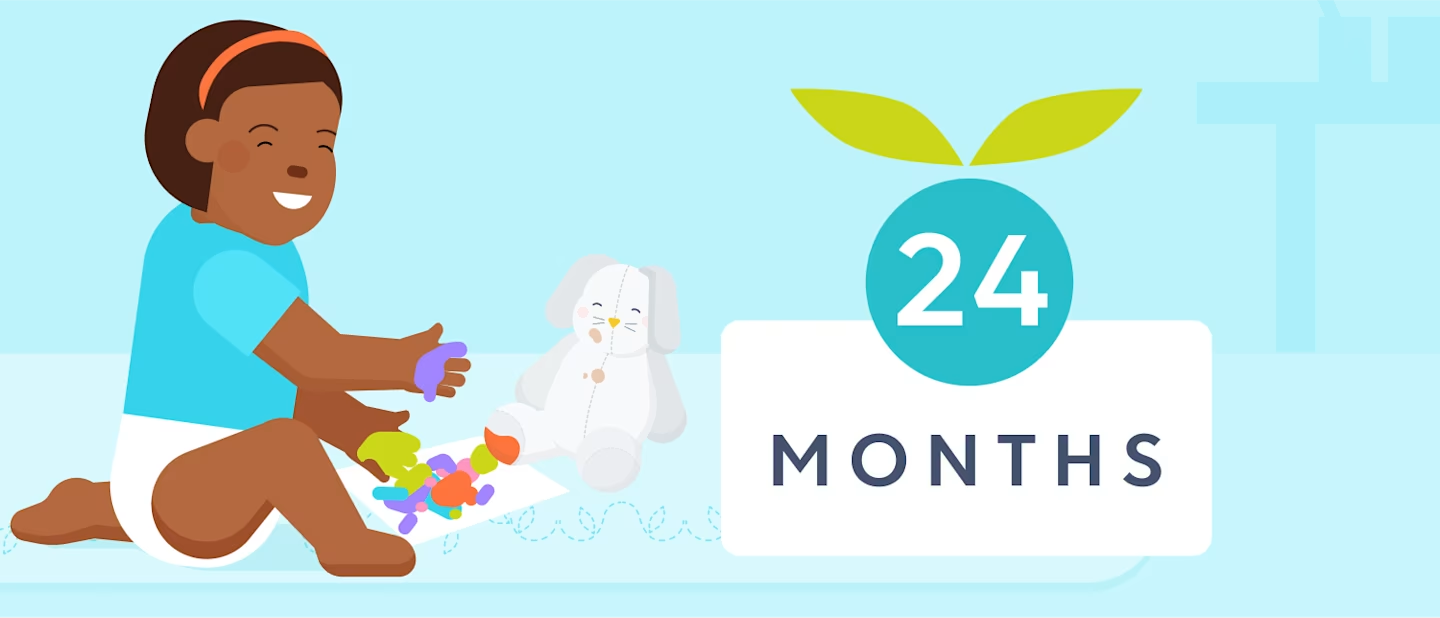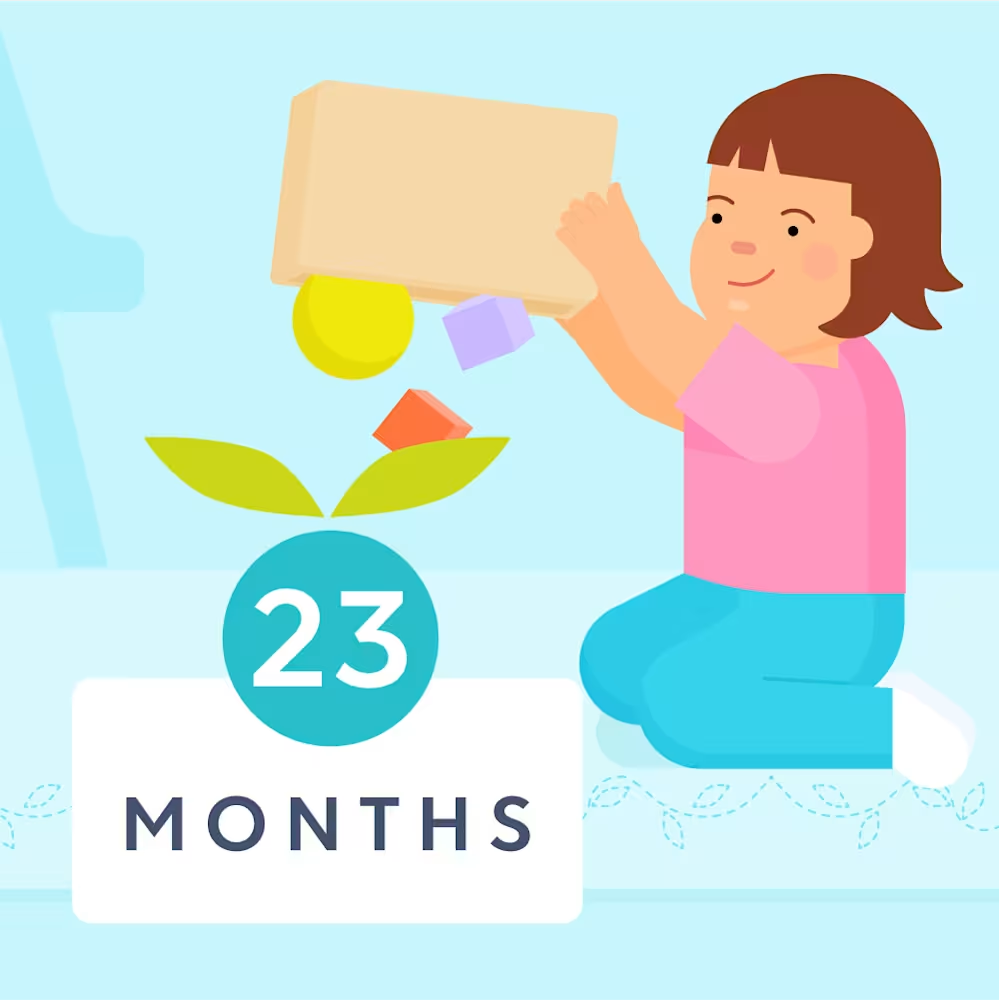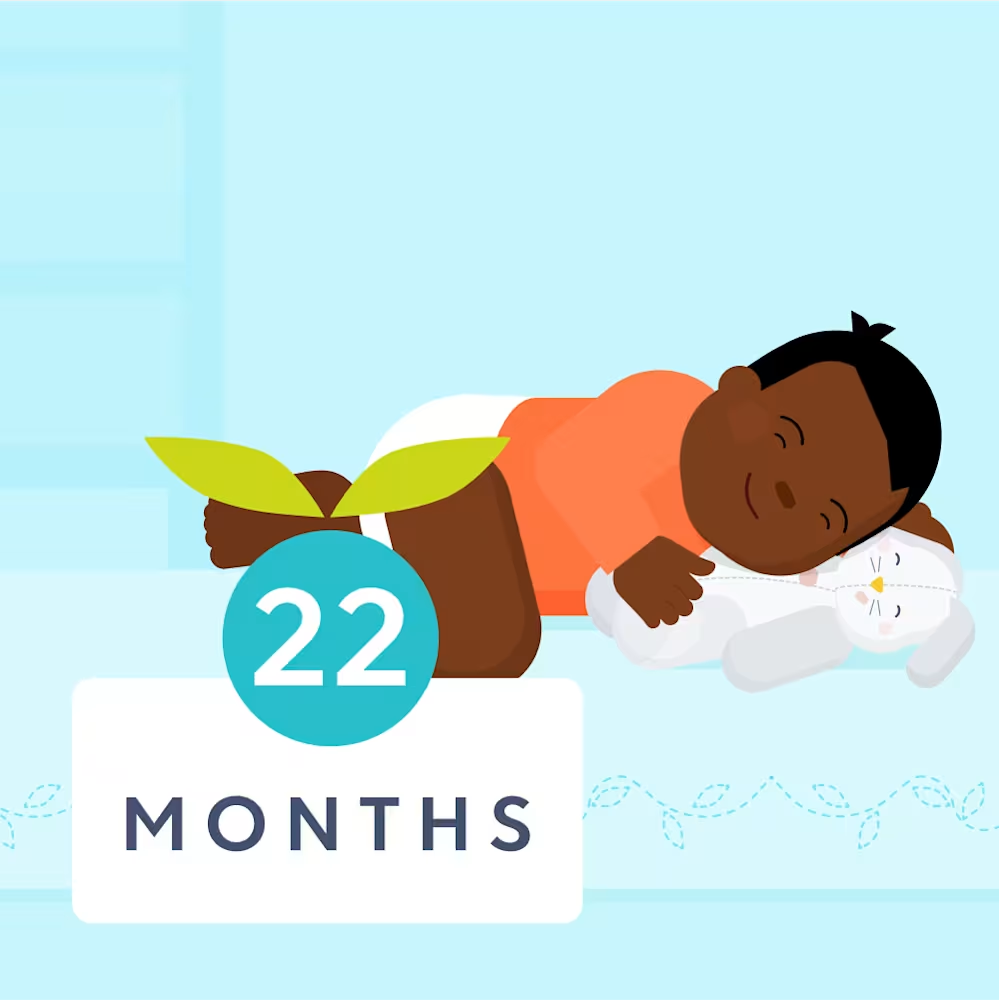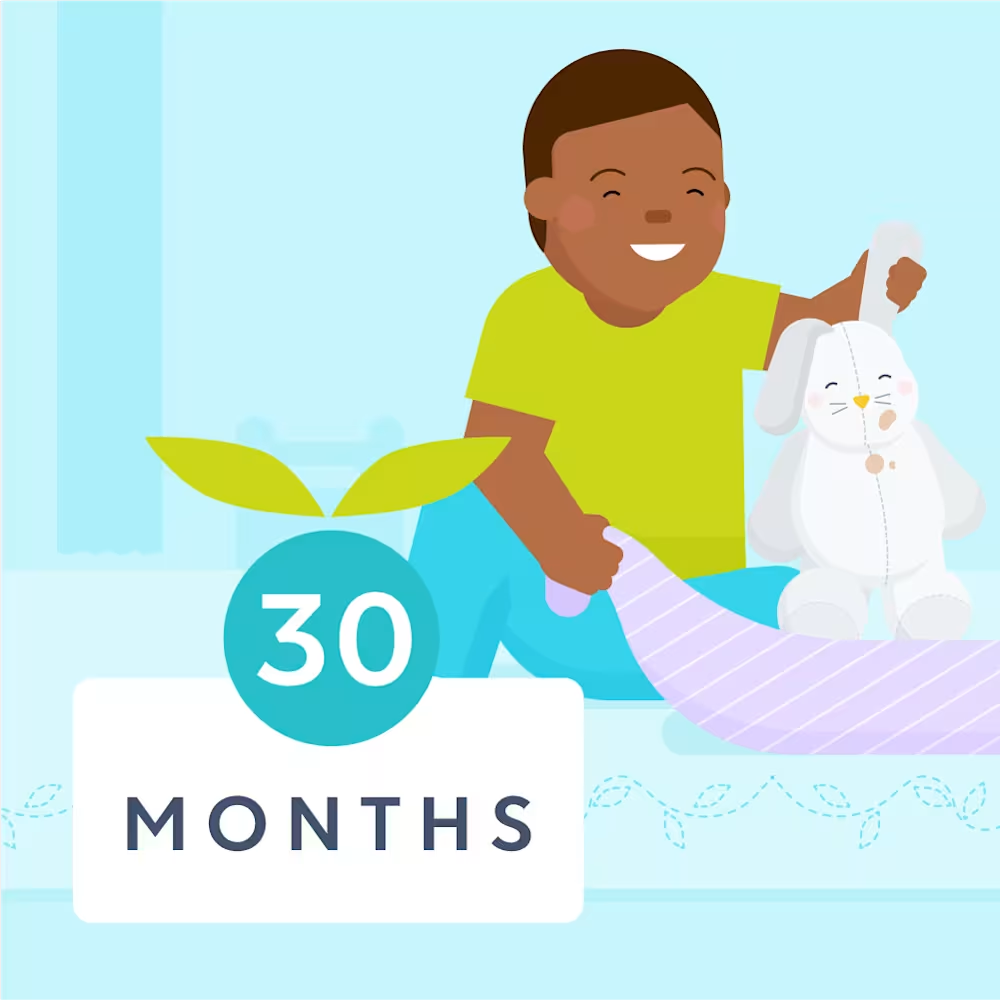24 month old / 2 year old sleep schedule: Bedtime and nap schedule
Updated Dec 16, 2025

Congratulations, your kiddo is 2! There are so many things to look forward to in this next year as their language, imagination, and physical abilities expand even more. One important way to foster this continued growth is by ensuring their sleep needs are met. No one functions well without enough shuteye — the same goes for toddlers working through big feelings. Tantrums are inevitable in toddler development, but getting enough rest can boost their mood and energy levels and reduce them [].
Read on to learn ideal 24 month old sleep schedules, the ideal nap and bedtimes, and how to work through common sleep challenges.
How much should a 2 year old sleep?
Most 24 months olds need at least 12 hours of total sleep per day to be well rested. This usually breaks down to around 10 - 12 hours of nighttime sleep and 1.5 - 2 hours of daytime sleep.
A heads-up: Every kid's sleep pattern is different and there's variation in what's normal. Although we provide general guidelines for sleep hours, also keep tabs on your child's mood and energy levels to gauge if they’re getting enough rest.
Here's a quick overview of what you may expect when it comes to 24 month olds and sleep. Note that these figures are averages and should be used as guidelines.
Top sleep tip for 2 year olds
Is your 2 year old newly struggling with sleep, fighting bedtime, refusing naps, waking up multiple times per night, waking up early, or — joy of joys — all of the above? We call sudden changes in your kiddo’s sleep patterns a sleep regression. While new sleep challenges at this age are often dubbed the “,” there is no predestined timeline for bouts of poor sleep. Sleep regressions can happen at any age!
Around 2, bumpy sleep is often tied to developmental advances, changing sleep needs, fears, separation anxiety, and the effects of newfound independence. Thankfully, these challenges are typically short-lived if your little one was sleeping well before and you maintain boundaries (i.e. don’t start new habits that interfere with sleep).
It’s normal for your child to need a bit more comfort during a regression, but try to avoid starting habits you won’t want to keep — like co-sleeping or sitting with them as they fall asleep. Regressions can feel like a battle of wills, but staying calm and consistent goes a long way. Remind yourself this is temporary, and stick with the healthy sleep habits you’ve built. Look at what might be driving the sleep disruption. For example, if your child has outgrown their current schedule, a slightly later bedtime might help them fall asleep and stay asleep more easily.
Sample 2 year old sleep schedule

Note: Sleep needs vary by child, and this chart should be viewed as an example.
Morning rise: 7:00 AM
Wake window before nap: 5.5 hours
Nap: 12:30 PM - 2:00 PM (1.5 hour nap)
Get ready for bed: 7:15 PM
Wake window before bedtime: 6 hours
Asleep: 8:00 PM
Naptime schedule for a 2 year old
How many naps for a 2 year old?
Most 24 month olds should be on a , with the nap occurring at midday.
How long should a 2 year old nap?
Total daytime sleep duration for a 24 month old is typically about 1.5 - 2 hours. Most toddlers do best with a set schedule that allows for about 5.5 - 6 hours of awake time between sleep periods at this age.
1-nap schedule
1-nap schedule with short nap/early bedtime
Bedtime for a 2 year old
At this age, it’s very common for toddlers to test boundaries, especially at bedtime []! Whether it’s wanting to read “just one more book,” running away and hiding when it’s time to put on pajamas, or throwing a as you put them in their crib, most toddler parents are no strangers to bedtime battles.
If you’re not sure the best way to handle your and tantrums, you’re not alone. Thankfully, the best solution is often simply “stick to the plan.” Remaining firm in setting boundaries and following through on your word is ultimately the response your child desires. When children know what to expect, it helps them feel secure and confident.
What time should a 2 year old go to bed?
Toddlers thrive on routine, and a regular bedtime (often between 7:00 and 9:00 PM) can make a big difference in helping them fall asleep and stay asleep. Aim for a schedule that allows for 10 - 12 hours of nighttime sleep.
Try to keep bedtime consistent, but it’s okay to adjust a bit if your little one is really struggling to make it to bedtime after a short or skipped nap. Just try not to let naps run too late in the day — ending naps on time helps build enough sleep pressure and keeps their body clock in sync for a smoother bedtime.
Can you sleep train a 2 year old?
Absolutely! As children get older, (i.e. changing the way a child falls asleep) can incorporate different techniques than the ones we use with babies. However, the idea is the same — once a kiddo learns to fall asleep with less parental help, the quantity and quality of sleep typically improves.
Why does my 2 year old keep waking up at night crying?
Around 2, toddlers are growing and developing in all sorts of ways. However, these changes may contribute to night waking. Some factors that may lead to poor sleep around 24 months include:
Seeking independence
Mastering milestones
Need for a schedule adjustment
Parent-led sleep associations
Discomfort from illness or teething
Travel
Big life changes (like starting a new daycare or welcoming a new sibling)
If you’re looking for more sleep support, consider submitting for a personalized, step-by-step Sleep Plan via .
Is there a sleep regression at 24 months?
No dot on the calendar can pinpoint the start of a sleep regression — they can happen at any age. However, 2 is a common age when toddlers go through new sleep challenges like resisting or skipping naps, waking early, and/or waking up more at night. Because of this, you’ve probably heard of the so-called “.” Still, not all children will go through this rough patch.
Can my 24 month old sleep with a pacifier?
While the American Academy of Pediatric Dentistry notes that prolonged pacifier use can affect mouth and dental development, it’s also important to consider your child’s sleep []. At 24 months, many toddlers still rely on the pacifier to nap, and taking it away too soon can lead to nap resistance or even dropping the nap altogether. This, in turn, can lead to new sleep issues at night.
If your child still uses a pacifier for sleep, we usually recommend waiting to remove it at naptime until after age 3, when sleep is more solid and they’re better able to manage without it.
Can a 24 month old sleep on their stomach or side?
The AAP recommends placing all babies under 12 months on their backs for sleep to help keep them safe. However, at 24 months, if your child falls asleep on their side or stomach and can easily move on their own, you can leave them in these positions.
What are the developmental milestones for a 24 month old?
At , your little one is likely doing (and saying!) exciting things. However, all children develop at their own pace and it’s OK if your little one isn’t doing all of these quite yet:
Walks and runs well
Can walk up the stairs with or without assistance
Turns a single page of a book
Holds and crayon and scribbles spontaneously
Stacks 4 blocks by 24 months and 10 blocks by 36 months
Says 200 - 1,000 words by 3 years old
Uses short sentences and phrases
Starting to name body parts and animals
Expresses a range of emotions
Notices when other people are upset or hurt
Says “no!” frequently and has temper tantrums
Engages in parallel play with other children
Enjoys being around kids
Starts to sort shapes and colors
Engages in early make-believe play
Does a 24 month old need to eat during the night?
Night feeding usually isn’t needed or . With good sleep habits and enough calories during the day, most children can sleep through the night at this age and wait until breakfast to eat. If you find your toddler is waking up hungry overnight, consider offering a pre-bedtime snack (string cheese or peanut butter and crackers, for example) to help them stay full overnight.
Takeaway
We recommend at least 10 hours of sleep at night at this age and around 1.5 - 2 hours of daytime sleep. This helps ensure your little one is well-rested and can help curb tantrums.
Most 2 year olds do best with one daily nap, even if they resist naps (or take short naps) here and there. Children typically don’t give up napping completely until 3 years or older.
If your child goes through a nap-resistance phase, continue offering “quiet time” in their crib each day so that they can recharge and rest and you get that much-needed break during the day too.
If you're curious about what lies ahead, glimpse into the future to see what you might experience once your baby is on a . Also check out a to see how far your little one has come.
Share article:
Note: The content on this site is for informational purposes only and should not replace medical advice from your doctor, pediatrician, or medical professional. If you have questions or concerns, you should contact a medical professional.
5 Sources
Share article:








